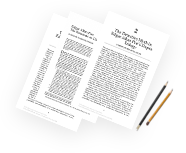Ableism Facts:
-Ableism is a form of discrimination.
-Ableism is usually not noticed by those who don’t have a disability.
-In the 1700s up to the 1900s, if you had a disability, you were thought to have something to do with witchcraft or sin.
-Most shops and stores are accessible for the disabled.
-Other stores are not accessible for the disabled.
-An ableist society would be one, which the disabled aren’t a part.
-There are many stories from disabled people themselves, saying that someone has been extremely rude to them at least once in their life.
-Today, about twenty percent of the population is disabled.
-However, even with a large amount, the disabled face challenges every day.
Ableism Opinions:
-The world needs to be more caring towards the disabled.
-The disabled need more places to have, “handicapped accessibility.”
-There needs to be an end to discrimination.
-With a small portion of ablest, the smaller the amount of hate.
Answer all the prompts below:
- What are the most important things a health care provider can do to avoid discrimination (use the American Nursing Association pdf attached to help). nurses-role-in-providing-ethically-and-developmentally-appropriate-care-to-people-with-intellectual-and-developmental-disabilities.pdf
2. What feelings do you experience when you see a person with a visible disability (e.g. wheelchair user, the person who is blind)? Why do you think we feel this way?
3. How do you think your reactions to people with disabilities affect people with disabilities?
4. Is even using the word disability enabling prejudice, why not use differently-abled?
5. What are the individual, cultural, and institutional changes that can create a more inclusive society?
Expert Solution Preview
Introduction:
As a medical professor, it is crucial to address the topic of ableism within the healthcare profession. Ableism refers to the discrimination or prejudice against individuals with disabilities. This assignment aims to explore the importance of avoiding discrimination as a healthcare provider, understanding our feelings towards individuals with visible disabilities, the impact of our reactions on individuals with disabilities, the use of language when discussing disabilities, and the changes required for a more inclusive society.
Answer to prompt 1:
To avoid discrimination, healthcare providers must adhere to guidelines provided by professional organizations such as the American Nursing Association (ANA). The ANA emphasizes the need for ethical and developmentally appropriate care for individuals with intellectual and developmental disabilities. Some essential measures include:
1. Education and awareness: Healthcare providers should stay updated on current healthcare policies, laws, and guidelines related to disability rights. Ongoing education can help foster a better understanding of the unique needs and challenges faced by individuals with disabilities.
2. Person-centered care: Healthcare providers should prioritize individualized care plans that respect the autonomy and dignity of individuals with disabilities. Collaborating with patients and their families to create care plans ensures that their preferences and needs are considered.
3. Eliminating biases: It is important for healthcare providers to recognize and address their own biases and prejudices towards individuals with disabilities. They should strive for unbiased and compassionate care, treating all patients with equal respect and attention.
4. Accessibility: Healthcare facilities should be designed to be accessible for individuals with disabilities. This includes providing ramps, lifts, and other assistive devices, as well as ensuring accessible formats for communication and information.
Answer to prompt 2:
When encountering a person with a visible disability, various feelings may arise, including curiosity, sympathy, empathy, or even discomfort. These emotions can stem from societal conditioning, lack of exposure, or uncertainty about how to interact with individuals who are different from us.
We might feel sympathetic because we recognize the challenges they may face due to their disability. Empathy could arise as we try to imagine ourselves in their situation and acknowledge the strength and resilience they display. On the other hand, discomfort might arise due to unfamiliarity or a fear of saying or doing something inappropriate.
Answer to prompt 3:
Our reactions towards individuals with disabilities can significantly impact their lives. Negative reactions, such as pity or exclusion, reinforce stereotypes and contribute to feelings of isolation and discrimination. Conversely, positive reactions that show empathy, inclusivity, and respect can help individuals with disabilities feel valued and supported within society. By treating individuals with disabilities with dignity and equality, we can contribute to their overall well-being and promote a more inclusive environment.
Answer to prompt 4:
The terminology used to describe disabilities is a complex topic. While the term “disabled” has long been used, some argue that it may reinforce a sense of limitation or negativity. On the other hand, “differently-abled” emphasizes the unique abilities and strengths of individuals with disabilities.
However, language preference varies among individuals with disabilities. Some may identify with the term “disabled” as it recognizes their specific challenges, while others embrace the term “differently-abled” for its more positive connotation. Ultimately, it is essential to respect the preferences of individuals when discussing their disabilities, allowing them to guide the conversation on how they wish to be addressed.
Answer to prompt 5:
Creating a more inclusive society requires individual, cultural, and institutional changes.
Individually, we need to challenge our biases, raise awareness about ableism, and educate ourselves about the experiences and needs of individuals with disabilities. By acknowledging and rectifying our own prejudices, we can contribute to a more inclusive mindset.
Culturally, society should promote inclusive values and celebrate diversity. This involves recognizing the achievements and contributions of individuals with disabilities, as well as promoting representation and equal opportunities for them in various spheres of life.
Institutionally, we need to implement policies and practices that prioritize accessibility and inclusivity. This includes ensuring physical accessibility in public spaces, providing reasonable accommodations, and promoting inclusive hiring practices. Additionally, healthcare and educational institutions should incorporate disability awareness and cultural competence training into their curricula.
By combining individual awareness, cultural acceptance, and institutional changes, we can strive towards a more inclusive society where individuals with disabilities have equal opportunities and their contributions are valued and celebrated.




